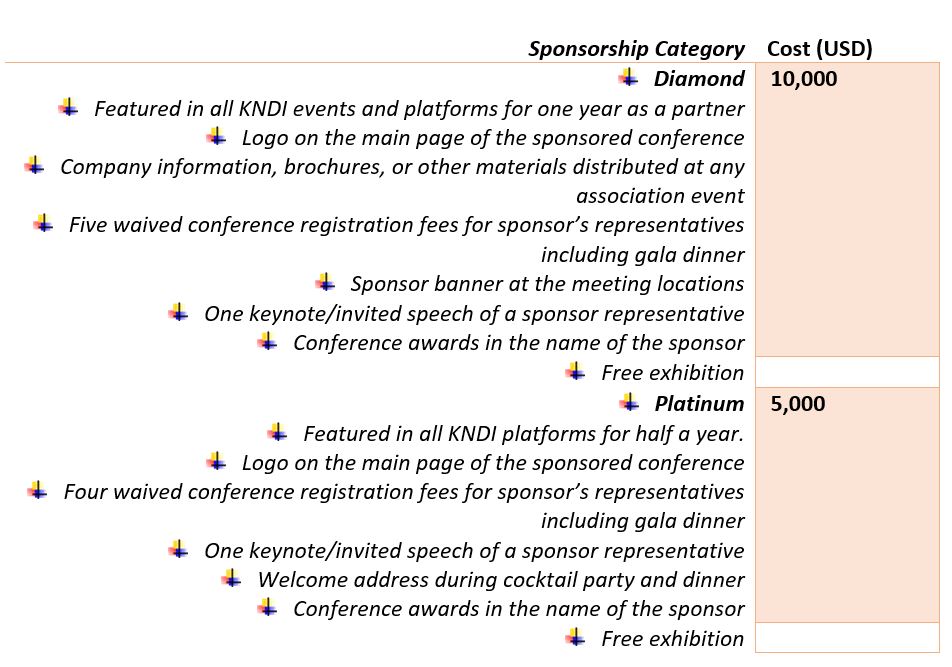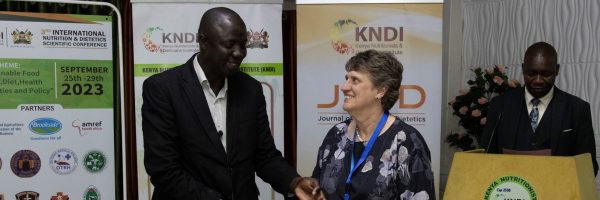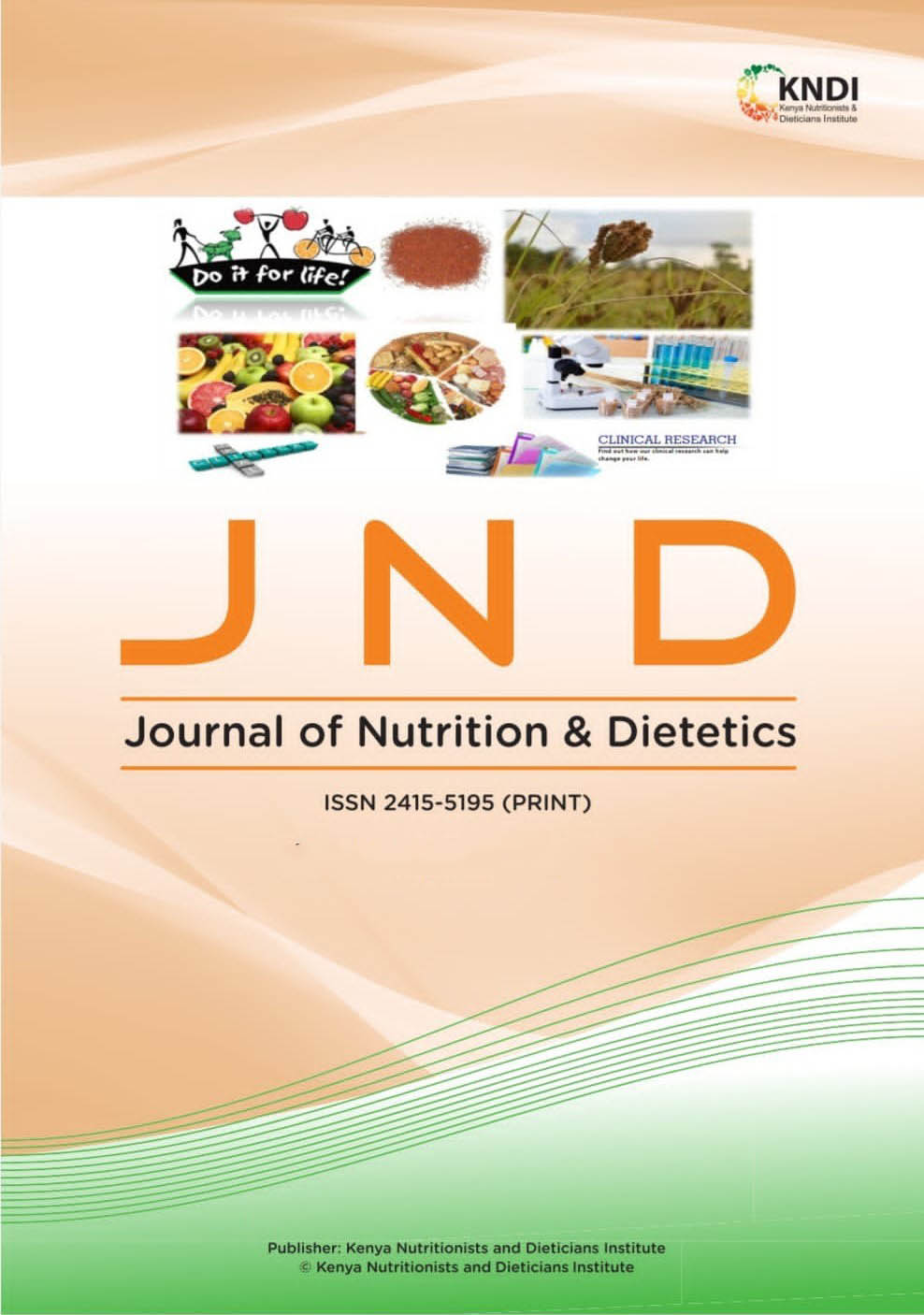
INTERNATIONAL NUTRITION
& DIETETICS
SCIENTIFIC CONFERENCE
BY JND

(Food, Animals,
Plants and Humans).

for the conference

for the conference
Organizers
The Journal of Nutrition and Dietetics (JND) Nairobi
Dates
12 th to 16 th August 2024.
Venue
Kenya Nutritionists and Dieticians Office Complex, Mlolongo, Kenya
Mode of Delivery
Both Physical and Virtual Blend
Key Note Speakers
About KNDI
Kenya Nutritionists and Dieticians Institute (Nutritionists and Dieticians Act 18, 2007) is established under (Cap 253B) as a state corporation regulatory authority on matters related to Nutrition and Dietetics in Kenya. Under section 6(e) of the Act, the institute is to research and provide public education on Nutrition and Dietetics issues in Kenya and beyond. This core function now delegated to ATRI PLC which currently hosts the Journal of Nutrition and Dietetics and has obligations to partner with various research institutions and scientists globally.
About KNDI’s ATRI Centre for Excellence in Research, Innovation and Publication
The programme enables ATRI-PLC and by extension KNDI to respond proactively to nutrition challenges of the coming millennium by engaging in priority area researches either actively or through training institutions and such bodies that deal on matters related to nutrition and dietetics in Kenya. The research policy to guide this process seeks to provide a framework for the undertaking of nutrition research by nutrition and dietetics scientists both in academia and programming areas. The overall goal is to strengthen nutrition research done in training institutions in Kenya and beyond. This core function is being achieved through a platform where researchers from different parts of the world share their latest research outputs that would drive the agenda for nutrition education in order to spearhead the dissemination of innovative scientific knowledge in the field of Nutrition and Dietetics.
About the Conference
One Health (Food, Animals, Plants and Humans)
One Health covers the entire spectrum of disease control. It includes prevention, detection, readiness, response, and management. It connects humans, animals, and the environment to global health security. The globe faces an unprecedented challenge in the decades ahead of 2050: producing 60% more food than is currently produced to feed the estimated 9 billion people (Loboguerrero et al., 2019). One Health initiative is essential in addressing the challenge of producing more food because it recognizes the interdependence between human health, animal health, and the environment. By taking an integrated approach that considers the health of people, animals, and ecosystems. One Health can help identify and implement sustainable agricultural practices, reduce the negative impacts of climate change on food production, and promote food safety and security for a growing population. It also aims to optimize and sustainably balance the health of people, animals, and ecosystems through an integrated and unifying approach. Healthcare systems around the world are burdened by zoonotic illnesses, particularly in developing countries. According to a study by Shaheen (2022), out of the 1400 infectious diseases that affect people, 60% have zoonotic origins, meaning they can be transmitted between animals and humans. One Health acknowledges the interdependence between human healths, domestic and wild animals, plants, and the larger environment, including ecosystems. Collaboration across sectors and disciplines is essential to protect health, address health challenges like infectious diseases, antimicrobial resistance, and food safety, and promote the health and integrity of our ecosystems (WHO May 2022).
Additionally, child malnutrition is a pressing global health issue that affects millions of children worldwide. It can lead to stunted growth, cognitive impairments, and increased infection susceptibility. Recent studies have shown that the gut microbiota plays a crucial role in nutrient absorption, immune
function, and overall health. Disruptions in the gut microbiota due to factors like infections, diet, and genetic variables can contribute to the progression of malnutrition. Understanding the complex interactions between the host and gut microbiota can provide valuable insights for developing
therapeutic approaches and interventions to mitigate the negative consequences of child malnutrition. (Zoghi et al., 2023). The concept of "the good life" encompasses diverse perspectives and values, including small-holder farmer movements, indigenous groups, and feminist, autonomist, and eco-anarchist movements. These perspectives challenge dominant discourses on food systems, social structures, and economic growth. One Health recognizes the importance of considering these diverse perspectives and promoting equity and social justice in global health. By addressing power dynamics, promoting inclusivity, and valuing the well-being of people, animals, and the environment, One Health can realise a more equitable and sustainable vision of "the good life" for all.(Juskaite & Haug, 2023). Implementing the One Health approach faces challenges like institutional barriers, limited funding, and cross-sectorial collaboration. Cultural and religious doctrines may influence adoption. Addressing these and focusing on policy and governance is crucial for achieving global health population goals. KNDI is in the front line towards ensuring this is met, and this conference will provide such a platform going forward. In light of all this, the Kenya Nutritionists and Dieticians Institute, in collaboration with partners across Africa, will hold a conference to discuss “One Health (Food, Animals, Plants and Humans.)”
Themes and Sub-themes of 4th international conference in the Series
The Theme of this Conference is One Health (Food, Animals, Plants and Humans). The Theme will be discussed under the following Sub-themes:
1. Geo-political conflicts and Food Systems
2. Micro-Biota and Early Stage Malnutrition
3. Climatic Change and Food Systems Value Chain
4. Multi-sectoral and Multi-disciplinary collaborations
5. Zoonotic diseases, Food and Human Health
6. Micronutrient Food Processing, commercialization and Health.
7. One Health, Food Systems and Anthropology (Culture, Religious Doctrines)

Dr. David Omondi Okeyo
Chief Editor, JND
PURPOSE, OBJECTIVES AND OUTPUT
Objectives
-
The following objectives shall guide this conference
1. Identify key research and knowledge gaps with regard to Nutrition and dietetics
2. Inspire global and regional research that will lead to peer-reviewed publications and scientific reports, co-designed and co-produced knowledge leading to effective and inclusive nutrition and dietetics practices.
3. Stimulate new areas of research in Nutrition and dietetics
4. Discuss global and regional nutrition and dietetics agenda and develop policy briefs to inform nutrition action plans and scale up the nutrition movement.
5. Create a platform for technical expertise and professionals to build a framework for developing wellness centers as first-line preventive mechanisms.
6. Initiate global, regional and local collaboration and networking among scientists to push the global research agenda in Nutrition and dietetics.
Outputs
-
The following are the expected outputs for this conference:
1. A wide collection of scientific research shared from different sub-themes of the conference.
2. High-quality manuscripts and abstracts peer-reviewed and published in the Journal of Nutrition and Dietetics.
3. Evidence-based policy briefs developed from several research findings and proceedings to inform policymakers on new areas of focus.
4. Collaborative networks created to move the health, nutrition and dietetics agenda forward.
Conference Workshops
The conference shall have workshops under the highlighted areas below, and persons who would like to host the workshops are invited to submit a 350 words Abstract with the workshop’s details and the participants’ learning objectives. One or more persons can run the symposiums; therefore, the persons running the symposiums should be included as part of the submission. The workshops will be held between the 12th to the 15th of August 2024. They shall run class room style for two hours every morning from 8:00am – 10:00 am
Navigating sustainable food systems
Food Processing and Manufacturing
Nutrition and the Human Gut Microbiome
Performance Nutrition
Obesity & Non-Communicable Diseases
Panel Discussions
The conference targets six areas of panel discussions as follows:
Functional Food for Health
The position of nutrition in Primary health care
Geo-political wars sustaining food systems
Indigenous Knowledge of Food Systems
Food, Nutrition in the context of Politics
Indigenous Knowledge of Food Systems
Cpd Points Award During The Conference
The conference will be an opportunity to ensure that nutritionists and dieticians are kept abreast of the new developments in preventive as well as curative services and will enable professionals to earn CPD points as per https://www.kndi.institute/notices/kndi_cpd_notice.pdf

Individual Conference Participation Fee
The conference shall have different fees for both virtual and physical participants, as shown below. The Conference registration fee, shall be inclusive of: Conference and Workshop Attendance, Conference Meals and the Conference Package

Advertisement and Exhibition Fee

Sponsorship Fee

TRANSPORT AND ACCOMMODATION
Transport

Accomodation










